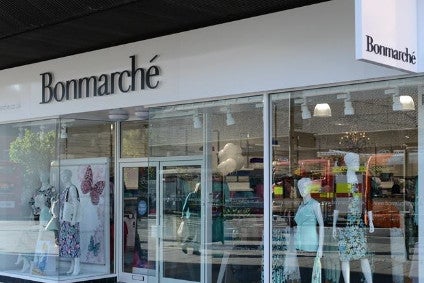
The chief executive and chief financial officers of UK women’s value clothing retailer Bonmarché Holdings Plc have sold their shares in the business to Edinburgh Woollen Mill-owner Philip Day who has made a takeover bid for the company.
Day’s investment vehicle Spectre Holdings bought a 52.4% stake in the retailer back in May, triggering a mandatory takeover bid. The company said it was “well positioned to provide advice, guidance and support to secure the long term future of the Bonmarché business, its stores and employees” and that its owner has a “successful track record within the retail sector, especially in turnaround and distressed situations.”
Bonmarché has released several negative trading updates recently, with shares tumbling in March following a profit warning on the back of weaker trading. The retailer forecast underlying profit before tax loss for the year of between GBP5m and GBP6m (US$6.64bn-$7.97bn), compared to a range of breakeven to a loss of GBP4m forecast in December.
At the end of last week (27 June), Bonmarche’s board swung in favour of an offer for the business from Day amid poor trading during the first quarter, even though it reiterated the offer did “not adequately reflect the potential longer-term value of the business.”
However, the same day, Spectre moved to withdraw the offer on the table on the back of Bonmarché’s poor trading performance – saying it now believed Bonmarché needed to reduce its cost base “to a sustainable level” and that a detailed review of the business including a store-by-store profitability assessment should be carried out.
“In light of this information, Spectre believes it is now forced to close the offer,” it confirmed. “In accordance with the announcement made on 16 May 2019, Spectre must give not less than 14 calendar days’ notice before closing the Offer. As a result, the Offer will close at 5.00pm on 12 July 2019.”

US Tariffs are shifting - will you react or anticipate?
Don’t let policy changes catch you off guard. Stay proactive with real-time data and expert analysis.
By GlobalDataBonmarché would not officially comment when approached by just-style. However, the company is maintaining its recommendation that shareholders accept the offer. In its latest director dealings disclosures dated 1 July, Bonmarché’s CEO Helen Connolly sold 42,542 shares at the offer price of GBP4,689 and CFO Stephen Alldrige sold 508,910 shares for GBP58,245.
Rick Smith, managing director of company rescue and insolvency specialists Forbes Burton, comments that although Day now holds a controlling stake in Bonmarché, there are likely to be some challenging days ahead.
“As it’s on the brink of collapse, within a challenging high street climate, there are a few ways he can revitalise the chain. Unfortunately, this might mean cutting the number of stores significantly, strategically closing the least profitable ones. Sadly, this will inevitably lead to job losses.
“Similar retailers who have made their way through such situations have also made sizeable sacrifices to the number of head office staff. This often saves a good portion of expenses. Similar job losses may well be felt at distribution centres, in order to maximise revenue and save on profit. The products may also need to be considered, a reduction in volume of clothing ranges and quantities may need to be curtailed to ensure a leaner, more agile business and suppliers could well expect a knock at the door for renegotiations in the coming months.
“Bonmarché is a trusted brand, but might need to look into ways of increasing online sales. A website overhaul or digital marketing techniques could prove useful here.
“Bonmarché can survive with Day’s help, but this would need significant investment alongside the main areas of concern that already exist. More early intervention is needed when it comes to the high street; too many chains are slipping too easily into trouble that can often be spotted a way off.”




